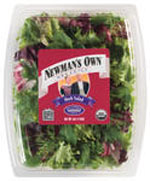We were writing this Pundit while up in Long Island. Mrs. Pundit had run into a Stop & Shop to pick up some pharmaceuticals but she also brought the Jr. Pundits some sustenance in the form of a master pack of Mott’s brand sliced apples.
These are marketed by C.H. Robinson and are part if its niche brand strategy whereby it acquires or creates separate brands for different product lines or categories. So C.H. Robinson uses Mott’s in the apple category, Tropicana in the citrus category and Welch’s in the grape category.
 For awhile it had Newman’s Own for use in the organic fruit and vegetable business until Paul Newman, may he rest in peace, got cold feet when, as a result of the spinach crisis, he realized what a food safety issue with fresh produce could do to his brand. Suddenly the licensing fee didn’t seem worth it at all and he brought the project to a halt. Eventually C.H. Robinson set up its own brand, Our World Organics, which we wrote about here, for the organic category.
For awhile it had Newman’s Own for use in the organic fruit and vegetable business until Paul Newman, may he rest in peace, got cold feet when, as a result of the spinach crisis, he realized what a food safety issue with fresh produce could do to his brand. Suddenly the licensing fee didn’t seem worth it at all and he brought the project to a halt. Eventually C.H. Robinson set up its own brand, Our World Organics, which we wrote about here, for the organic category.
Paul Newman’s instinct was understandable and we have long said that we have severe doubts that organizations such as Disney have ANY stomach for being associated — even once — with the severe illness or death of a child. The very first such incident will likely be the last because the licensing deal will be terminated.
Yet as we sit here munching on Mott’s brand sliced apples — we stole a few from the Jr. Pundits to check them for quality, which was quite good — it occurs to us that the whole licensing model is kind of upside down when it comes to brands best known for processed product. We are not privy to any secret information but, presumably, C.H. Robinson pays some sort of licensing fee to Mott’s, Tropicana and Welch’s in order to use such well known brands. That is the way the business works.
We would suggest, however, that if these branded organizations had a truly sophisticated understanding of the intersection of their interests and the fresh market, they would pay C.H. Robinson a fee for each box of fresh product sold — especially fresh product, such as these apple slices, that is generously labeled Mott’s at the consumer level.
Why should these branded giants do this? Simple, the halo effect that freshness has on the processed product.
We’ve known about this for years. Ocean Spray has persevered in the very difficult fresh cranberry business long after it was insignificant to either sales or profits, because the consumer seeing those Ocean Spray fresh cranberries each fall in the produce department thought better about Ocean Spray juices year round.
So the real interest of the owners of these brands is to maximize the consumer exposure to the product in a fresh form. Let every mom reaching out for juice or jelly be thinking about delicious Mott’s fresh apples, Tropicana fresh navel oranges and Welch’s delicious fresh grapes. Surely moms will surmise that the processed product is made from the same fresh product that they know and enjoy.
The license fee paid to use the names on fresh must be inconsequential, but the change in consumer perception is priceless.
Focusing on maximizing licensing fees is simply penny-wise and pound-foolish. The focus should be on maximizing consumer impressions to fresh product.






